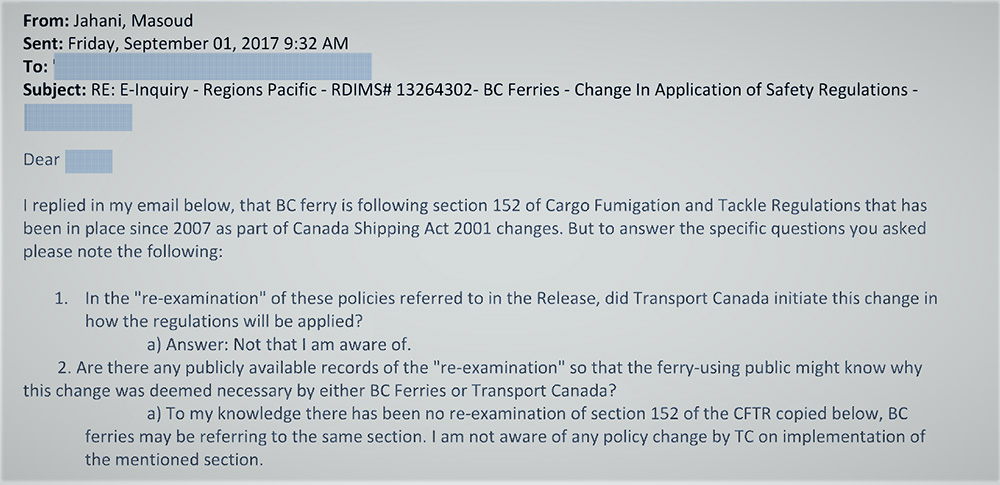As British Columbians were warned to fight a second wave of COVID-19 by avoiding mingling with large groups, BC Ferries refused to allow passengers to stay in their cars on lower decks for their journeys — a change in policy that triggered complaints from the worried public and frustrated Premier John Horgan.
BC Ferries had let riders remain isolated in their vehicles beginning March 16 as a response to the COVID-19 threat. When it reversed that policy on Sept. 9, effective Sept. 30, the company said it had to meet safety requirements imposed by Transport Canada.
But emails obtained by The Tyee show not all voices within Transport Canada shared that view. One indicates the federal regulator could allow passengers on lower decks but that BC Ferries may not find what was required to continue to enable this to be “palatable.”
Enlarging the number of people sharing indoor spaces on ferries could increase the risk of transmitting COVID-19 depending on the situation, according to an expert on infection models.
In the days before the March 16 decision by BC Ferries to allow people to choose to remain in their cars, Transport Canada was conducting an internal conversation about the possibility. In one email, Diana Trager, regional director of marine safety and security at Transport Canada in B.C., says BC Ferries could do so and meet federal regulations.
“There are ways BCF could actually allow them [passengers] to stay on cardeck under current reg,” said Trager on March 14, adding in parenthesis, “(I don't think palatable to BCF, but should be understood).”

“I think we need to talk to BCF to understand that if it is allowed what potential mitigations could there be. (they agree there are risks, likely something they can do to reduce),” Trager continued in the same email.
She likely was referring to the need to warn and evacuate people in lower decks in the event of a fire or other emergency. In the past, BC Ferries had dealt with such risks by patrolling vehicle decks while the ferry was underway.

The Tyee asked Transport Canada what possibly unpalatable options BC Ferries had to enable passengers to remain in their vehicles during trips. The regulator’s response contradicted Trager’s email.
“There are no mechanisms which allow BC Ferries to let passengers remain on the enclosed decks, while complying with the regulations,” senior communications advisor Sau Sau Liu responded in an email.
Liu explained that marine accidents worldwide resulted in the legislation that emerged in 2007. “Enclosed vehicle decks are specifically designed to contain smoke and fire, in order to protect the other levels of the ship and allow more time for passengers and crew to stay safe and evacuate.”
And yet for nearly six months, because of the competing threat posed by COVID-19, BC Ferries did allow people to stay in their vehicles. The sudden about face on Sept. 9 frustrated Premier Horgan, who said, “This is something that’s being imposed, returning to a previous situation that we also felt was a bit heavy-handed for the inland waters that our ferries travel in.
“This is an unwelcome intrusion by the federal government at this time, and we’re going to pursue it aggressively,” Horgan vowed.
“I haven’t heard a positive response yet from the minister of transportation, but I’m going to keep pushing on it” said Horgan later in the month.
Adding to the confusion is that for a decade — between 2007 and 2017 — BC Ferries accommodated passengers who preferred to remain in their vehicles during travel.
Then that option was shut down by the former Crown corporation, which had been operating semi-privately since a change made by the BC Liberals in 2003. At the time, the company said it was complying with Transport Canada’s regulation — the one cited to The Tyee by Liu, which had been on the books since 2007 with no changes to it.
The corporation did not say what new information or event caused it or Transport Canada to change the policy suddenly in 2017.
In a 2017 press release, now removed from the BC Ferries website, the company stated that it had been complying with the Transport Canada guideline since 2007 by employing a “continuous car deck patrol.”
“BC Ferries and Transport Canada recently re-examined the policy and in an effort to co-ordinate safety practices will change the application of the regulation,” BC Ferries wrote.
The company again instituted a continuous car deck patrol and other protections this year during the six months it allowed people to remain in their vehicles.
Why had BC Ferries or Transport Canada decided that approach had to be scuttled? Neither entity gave The Tyee a clear answer to that question.
Some internal emails from Transport Canada obtained by The Tyee complicate the claim by BC Ferries in 2017 that it was just obeying orders from Transport Canada after a re-evaluation of the 2007 policy directive.
Capt. Masoud Jahani, then an inspector and assistant manager for Transport Canada, was asked whether Transport Canada had triggered the policy reversal. “Not that I’m aware of” replied Jahani to the person, whose identity is redacted in the released email.
“There has been no re-examination of section 152 of the CFTR” — the policy referenced in BC Ferries policy change. “I am not aware of any policy change by TC on implementation of the mentioned section,” Jahani added in the same email.

Emails from the public sent to Transport Canada and hundreds of messages posted on BC Ferries’ social media show that members of the public were perplexed and upset by the policy change in 2017.
And many worried for their safety when the policy resumed this month just as a second wave of COVID-19 infections hit B.C.
“As seniors who are over 70,” wrote one person last month, “we are being bombarded with the information that we are the most vulnerable people in what has now been declared a pandemic. We are also being told to avoid crowded places. Given the constant messages coming through the media that we are advised to self-isolate as much as possible, it seems incredibly short sighted for Transport Canada to adhere to the current ruling regarding lower vehicle decks during this alarming health crisis.”
“What if I have a compromised immune system and avoid people and can't be sick?” asked another passenger writing in pre-pandemic 2018. “I was travelling with my grandma who when she gets sick ends up being hospitalized 80 per cent of the time.”
The COVID-19 risk aboard ferries hasn’t been closely studied, says Caroline Colijn, a professor and Canada 150 research chair in mathematics for evolution, infection and public health at Simon Fraser University. But ferry interiors, she notes, “are an indoor environment. People are together eating, drinking, dining. These are the kinds of places where transmission can happen.”
Most ferry rides are fairly short, she added. “A 90-minute journey of which you spend a lot of time on the deck and 10 minutes inside using the bathroom and getting a coffee is probably not going to be a hotbed of risk.” However, “You could get a highly infectious asymptomatic person who manages to infect a bunch of people on a ferry. It has happened on boats. One of the summer outbreaks was on a boat. Obviously the fishing industry has had some. These are enclosed, indoor spaces with potentially lots of people. That presents some risk,” said Colijn.
Wondering whether BC Ferries might have changed its policy to save money, The Tyee asked BC Ferries how much its deck patrols cost. Deck patrols meant “no additional cost,” since they were performed by employees, said BC Ferries spokesperson Deborah Marshall.
What then did BC Ferries do to satisfy Transport Canada regulations during the period from March to September?
The company increased presence of vessel officers and crew on the car decks, added video monitoring of the same areas, and noted specific locations of passengers requiring assistance in the event of an emergency, said Marshall.
The Tyee asked if BC Ferries would resume the option to allow passengers to choose to remain in cars in lower decks at any COVID-19 case threshold.
“This is a Transport Canada regulation,” responded Marshall. “They relaxed it in March and reinstated it at the end of September. Re-enabling passengers to stay in their cars on the closed car decks would be a Transport Canada decision, not a BC Ferries decision.”
Liu echoed Marshall, saying Transport Canada “provided temporary flexibility” while the risks of COVID-19 were unknown in March.
“We have since learned more about how to protect ourselves and travel safely, while the marine safety risk to passengers on enclosed decks remains very real,” said Liu.
But even before the pandemic, Transport Canada cited public “complaints” in calling a meeting with BC Ferries and the Marine Workers Union to discuss whether to relax the ban on staying in vehicles.
People expressed their frustrations via letters, emails and Facebook posts. Some angry pet owners did not want to leave their pets in cars or designated pet areas. Such areas were inadequate and inappropriate for pets with health or behaviour issues with other animals, they claimed.
Others requested that BC Ferries allow booking upper decks with no requirement to exit cars from its reservation system.
“Given the different perspectives on passengers on the car deck, the complaints we continue to get from the public and the heightened sensitivities generally, I would like to have a company/union/TC discussion,” emailed a director at Transport Canada to set up meetings with the union and BC Ferries in 2018.
“The idea,” he said, “is to come up with solutions that everyone can live with.” ![]()
Read more: Rights + Justice, Transportation
















Tyee Commenting Guidelines
Comments that violate guidelines risk being deleted, and violations may result in a temporary or permanent user ban. Maintain the spirit of good conversation to stay in the discussion.
*Please note The Tyee is not a forum for spreading misinformation about COVID-19, denying its existence or minimizing its risk to public health.
Do:
Do not: